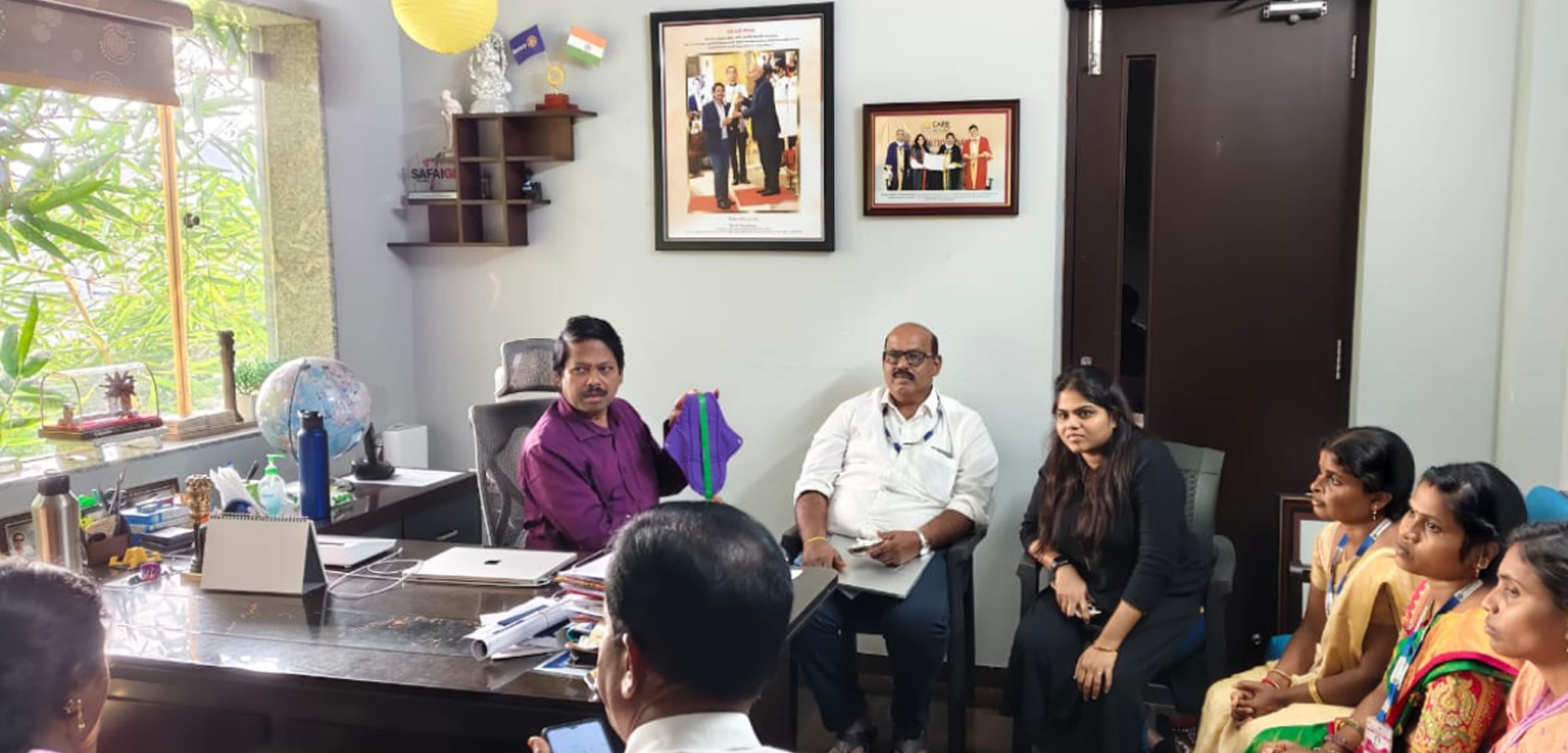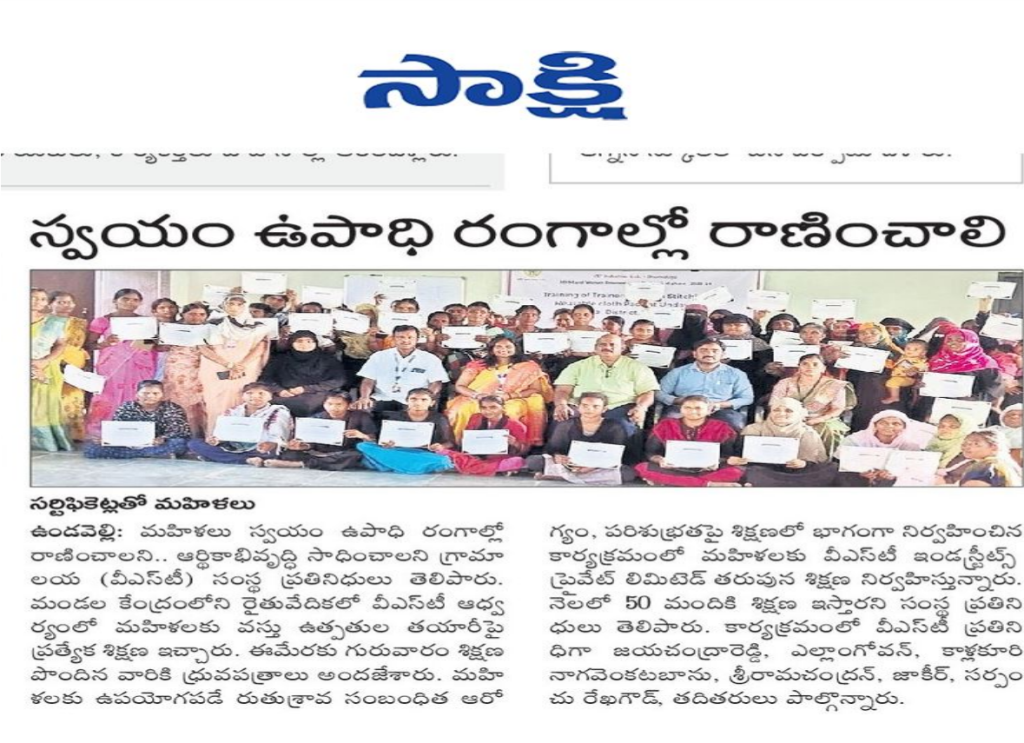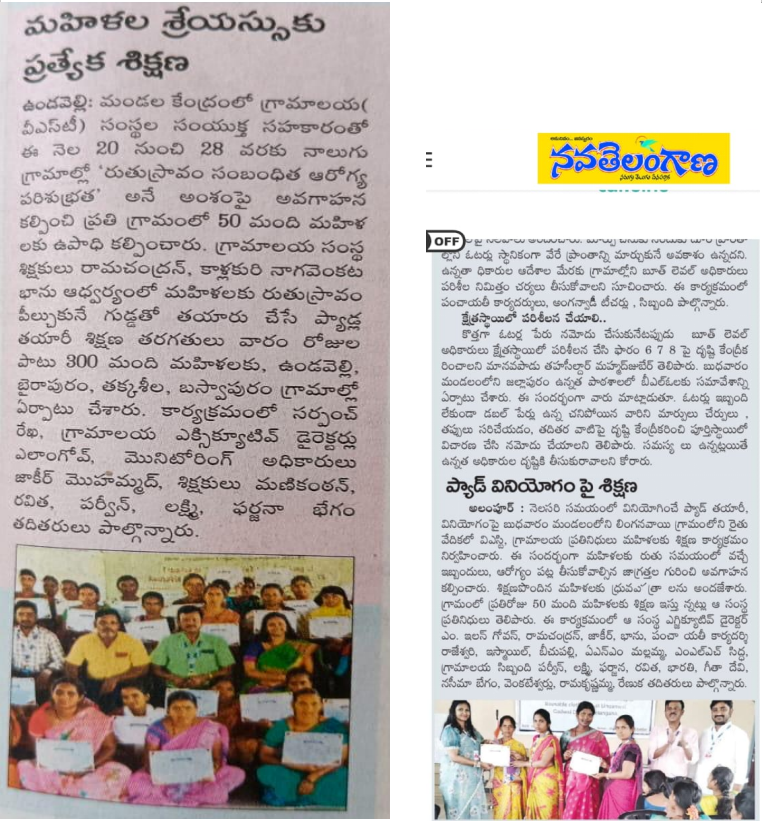- Home
- Women Empowerment Program
Women Empowerment Program
Women Empowerment Program
Documentation of Menstrual Health and Hygiene Management & Women
Empowerment Project Gadwal in collaboration with VST Industries
Gramalaya has been implementing the Menstrual Health and Hygiene Management & Women Empowerment Project Under the Guidance of Padma Shri S Damodaran, Founder and CEO, Gramalaya in Undavelly, Alampur, and Manopadu Mandal of Jogulamba Gadwal District, Telangana since 2023, with the support of CSR funding from VST Industries, Andhra Pradesh. Previously, Gramalaya, in collaboration with VST Industries, implemented the Swachh Ghar Mission in Andhra Pradesh and Telangana, promoting around 7,794 Individual Household SMART toilets—a zero-waste toilet model that converts human waste into manure through twin leach pit technology in Gadwal District.
Alongside toilet construction, Gramalaya also conducted hygiene education programs covering clean water, safe sanitation, personal hygiene, menstrual hygiene management (MHM), and nutrition. Initially, many women in these villages hesitated to participate in awareness programs due to social restrictions and were not even allowed to be photographed during sessions. However, as the SMART toilets transformed their villages into clean, open defecation-free communities, the men in the community began recognizing the value of hygiene education. Over time, they started supporting women’s participation, enabling them to engage more freely in discussions about health, hygiene, and menstrual well-being.
In Trichy, Tamil Nadu, Gramalaya is empowering underprivileged women by training them to manufacture and market reusable cloth menstrual pads. This initiative not only improves their health and economic stability but also helps protect the environment. Single-use sanitary pads contribute to land pollution, overflowing landfills, and air pollution when burned. They also contaminate water sources and pose risks to animals and birds when disposed of improperly. Additionally, many of these pads are collected and handled by sanitation workers with bare hands, exposing them to health hazards. Disposable pads take 500–800 years to decompose, whereas a single reusable cloth pad can replace up to 120 disposable pads by simply washing and reusing it. The production process is entirely handmade. Layers of soft cotton fabric are stitched together into the shape of a pad, with a leak-proof backing and a snap button closure to secure it to underwear. The finished pads are then packaged and distributed to local women, promoting a sustainable and hygienic alternative to disposable products. Through this initiative, Gramalaya is creating a healthier, more sustainable future for women while reducing the environmental impact of menstrual waste.

When Gramalaya shared its reusable cloth pad initiative, VST Industries was inspired to support a similar program in Gadwal District, Andhra Pradesh. Given Gramalaya’s previous work in the region promoting sanitary toilets, it was the ideal location to introduce this initiative. During the initial village awareness meeting on menstrual hygiene management (MHM) and reusable cloth pads, women who once hesitated to even be photographed actively participated in learning about menstrual health. With guidance from Gramalaya’s expert trainers, they were taught not only how to manufacture reusable cloth pads but also how to market them. In addition, they received menstrual health education from experts, covering topics such as the menstrual cycle, safe hygiene practices, proper use and maintenance of reusable pads, and breaking period-related stigma.
As a result, 2,600 women from different communities were trained in reusable pad production. They collectively manufactured 3,000 pads, which were distributed free of cost to encourage trial and gather feedback. Based on the positive feedback, they scaled up production, successfully selling 1,000 packs of reusable cloth pads at ₹400 per pack, with each woman earning ₹100 per pack as commission.
For Example, One woman alone successfully promoted 100 packs, earning ₹10,000 in commission, demonstrating the potential for financial independence through this initiative. The remaining amount from the sales was set aside as a rotating capital fund for purchasing raw materials and sustaining the business. This program not only empowered women with economic opportunities but also contributed to sustainable menstrual hygiene practices in the region.
Now, even the men in the village support women in traveling to different places to promote this eco-friendly and health-conscious initiative. PRI members have also extended their support, recognizing the program’s role in keeping the village clean by preventing the unsafe disposal of single-use sanitary pads.
The reusable cloth pads are now promoted under the brand name “Hamara Pads,” meaning “Our Pads,” which has gained recognition among local women. To sustain and expand this initiative, Gramalaya currently provides an honorarium to support the women, and a project coordinator has been appointed to guide them toward entrepreneurship. Soon, these women will form a federation, taking full charge of their operations, including material procurement, pad production, packaging, distribution, financial management, and business expansion. With the learnings from this initiative, Gramalaya aims to scale up the program in the coming years, empowering more women and promoting sustainable menstrual hygiene solutions.



